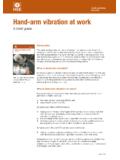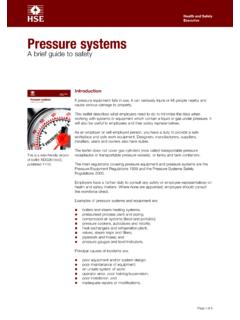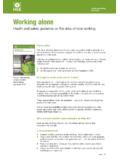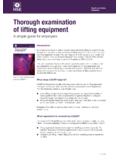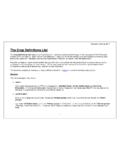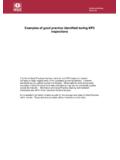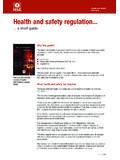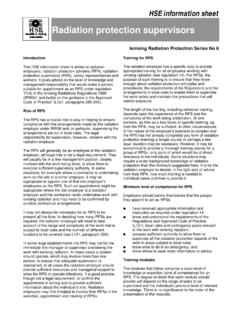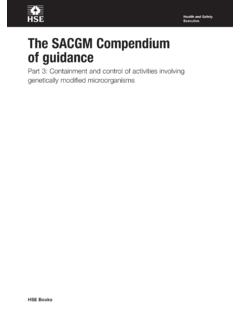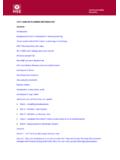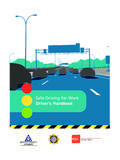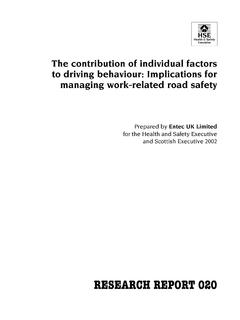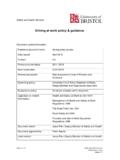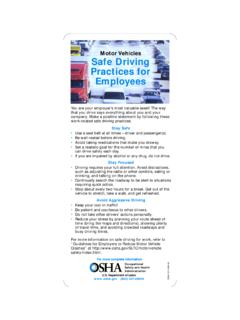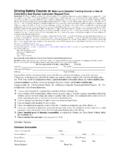Transcription of Health and Safety Executive Driving at work
1 Health and Safety Executive Driving at work Managing work -related road Safety Introduction More than a quarter of all road traffic incidents may involve somebody who is Driving as part of their work at the time (Department for Transport figures).1. Health and Safety law applies to work activities on the road in the same way as it does to all work activities and you need to manage the risks to drivers as part of your Health and Safety arrangements. This leaflet suggests ways you can do this. Effective management of work -related road Safety helps reduce risk, no matter what size your organisation is. It could also result in, for example: fewer injuries to drivers;. reduced risk of work -related ill Health ;. INDG382(rev1), reduced stress and improved morale. published 04/14. Health and Safety law does not apply to people commuting (ie travelling between their home and their usual place of work ), unless they are travelling from their home to somewhere which is not their usual place of work .
2 Who should read this leaflet? The leaflet applies to any employer with employees who drive, or ride a motorcycle or bicycle at work , as well as self-employed people. It also applies to those using their own vehicle for a work -related journey. It will be particularly valuable to those responsible for fleet management. Employees and their Safety representatives will also find it helpful. Employers with large goods vehicles (LGVs) or passenger carrying vehicles (PCVs). may also be subject to specific legal requirements that take priority over the general advice given here. The law Employers have duties under Health and Safety law for on-the-road work activities. The Health and Safety at work etc Act 1974 (HSW Act)2 states you must ensure, so far as reasonably practicable, the Health and Safety of all employees while at work .
3 You must also ensure that others are not put at risk by your work -related Driving activities. The self-employed have similar responsibilities. So far as reasonably practicable' means balancing the level of risk against the measures needed to control the real risk in terms of money, time or trouble. However, you do not need to take action if it would be grossly disproportionate to the level of risk. Page 1 of 10. Health and Safety Executive The Management of Health and Safety at work Regulations 19993 require you to manage Health and Safety effectively. You must carry out an assessment of the risks to the Health and Safety of your employees, while they are at work , and to other people who may be affected by your organisation's work activities. See Assessing risks on the road'.
4 You must consult with your employees and, where applicable, their Health and Safety representatives, on Health and Safety issues, including: risks arising from their work ;. proposals to manage and/or control these risks;. the best ways of providing information and training. There is more advice in the HSE leaflet Consulting employees on Health and Safety : A brief guide to the You also have duties under road traffic law, eg the Road Traffic Act and the Road Vehicles (Construction and Use) Regulations, which are administered by the police, and other agencies such as the Driver and Vehicle Standards Agency (DVSA). See Other useful contacts' at the end of the leaflet. In most cases, the police will continue to take the lead on investigating road traffic incidents on public roads.
5 HSE will usually only take enforcement action where the police identify that serious management failures have been a significant contributory factor to the incident. If one of your employees is killed, for example while Driving for work , and there is evidence that serious management failures resulted in a gross breach of a relevant duty of care', your company or organisation could be at risk of being prosecuted under the Corporate Manslaughter and Corporate Homicide Act 2007. There is more information on HSE's website ( ). How to manage work -related road Safety Organisations have a legal duty to put in place suitable arrangements to manage Health and Safety . This is a wide-ranging requirement, so HSE encourages a common-sense and practical approach. It should be part of the everyday process of running an organisation and part of good management generally.
6 An HSE leaflet explains how you can follow a Plan, Do, Check, Act' approach to help you achieve Here are some examples of how this approach can be applied to work -related road Safety . Plan Describe how you manage Health and Safety in your organisation and plan to make it happen in practice Assess the risks from work -related road Safety in your organisation. Produce a Health and Safety policy covering, for example, organising journeys, driver training and vehicle maintenance. Make sure there is top-level commitment to work -related road Safety in your organisation. Clearly set out everyone's roles and responsibilities for work -related road Safety . Those responsible should have enough authority to exert influence and be able to communicate effectively to drivers and others. Driving at work : Managing work -related road Safety Page 2 of 10.
7 Health and Safety Executive Do Prioritise and control your risks, consult your employees and provide training and information In larger organisations, make sure departments with different responsibilities for work -related road Safety co-operate with each other. Make sure you have adequate systems to allow you to manage work -related road Safety effectively. For example, do you ensure your vehicles are regularly inspected and serviced according to manufacturers' recommendations? Make sure you involve your workers or their representatives in decisions. This is a good way of communicating with them about Health and Safety issues. You must provide training and instruction where necessary. Check Measure how you are doing Monitor performance to ensure your work -related road Safety policy is effective and has been implemented.
8 Encourage your employees to report all work -related road incidents or near misses. Act Review your performance and learn from your experience Make sure you collect enough information to allow you to make informed decisions about the effectiveness of your existing policy and the need for changes, for example targeting those more exposed to risk. Regularly revisit your Health and Safety policy to see if it needs updating. Assessing risks on the road As an employer or self-employed person, you are responsible for assessing the risks to Health and Safety in your business. Risk assessment for any work -related Driving activity should follow the same principles as for any other work activity. You can delegate the task, but you will need to make sure it is carried out by someone who: is competent to do so (has the right skills, knowledge and experience).
9 Involves your workers in the process;. understands when specialist help may be needed. Risk assessment is about identifying and taking sensible measures to control the risks in your workplace, not about creating huge amounts of paperwork. You may already be taking steps to protect your employees, but your risk assessment will help you decide whether you should be doing more. The aim is to make the risk of someone being injured or killed as low as possible. See the HSE website ( ) for more information. A hazard is something in your business that can cause harm. A risk is the chance, however large or small, that a hazard could cause harm. Identify the hazards Look for hazards that may result in harm when Driving on public roads. Remember to ask your employees, or their representatives, what they think as they will have first-hand experience of what happens in practice.
10 You need the views of those who drive extensively, but also get the views of those who only use the roads occasionally. The main areas to think about are the driver, the vehicle and the journey. See the work -related road Safety checklist' for some suggestions about what to consider. Driving at work : Managing work -related road Safety Page 3 of 10. Health and Safety Executive Who might be harmed? Decide who might be harmed and how. This will usually be the driver, but it might also include passengers, other road users and/or pedestrians. Also consider whether there are any groups who may be particularly at risk, such as those new to the job and those Driving long distances and working long hours. Evaluate the risks Having identified the hazards, decide how likely it is that harm will occur.
